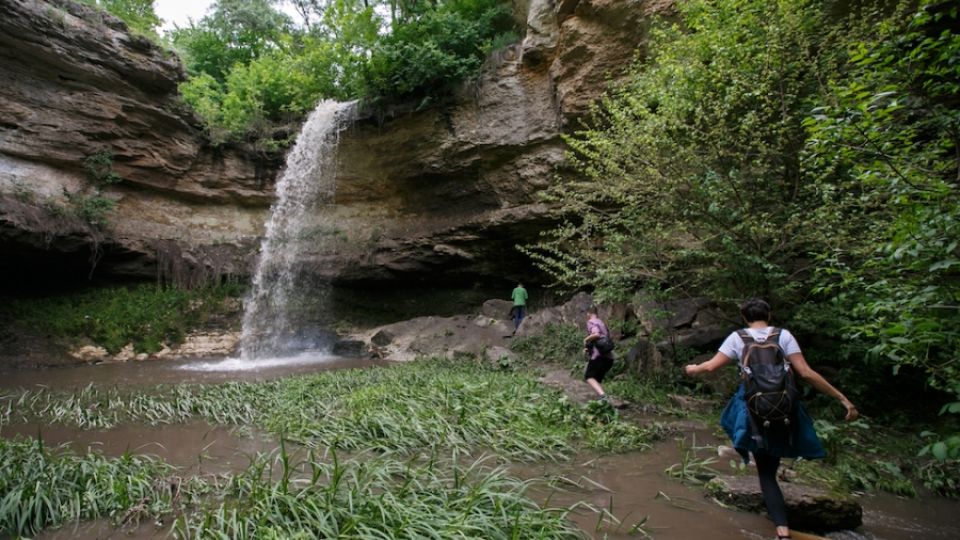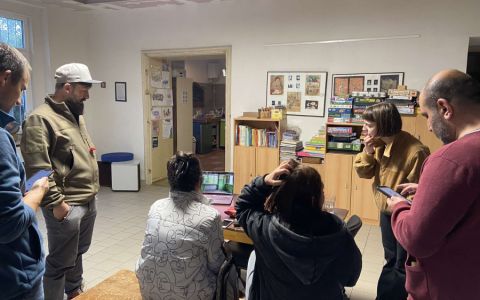In May, the Arnika team went to Moldova to continue international cooperation aimed primarily at protecting rivers and supporting communities on both banks of the Dniester. Czech and Moldovan experts on nature protection and public participation in decision-making processes and organizers of community events and campaigns had a joint program full of meetings with local activists and tree-planting planning sessions, but there was also a demonstration for better funding of national parks and samples were taken from local sources. The project “Adoption of Moldovan Rivers: Supporting Communities on Both Banks of the Dniester River” is being implemented by Arnika with the financial support of the Ministry of Foreign Affairs of the Czech Republic within the Transition Promotion Program.
In Transnistria, the team visited the non-governmental organization “Medics for the Environment” to help plan tree plantings and address related issues such as insufficient funding for systematic reforestation and missing facilities, as well as erosion and bank runoff during rains or extreme droughts. It then continued to the village of Doibani, where in the past there was a pesticide depot and newly planted conifers should help prevent the access of people and animals to the soil which is still contaminated.
Arnika and Eco-TIRAS have also set out for the Iagorlic nature reserve, which is - thanks to its specific and diverse habitats - home to many endangered species, especially from the aquatic environment, and is also a center of the river basins of the small rivers of Transnistria. The problem here is fluctuations in the level of the Dniester River due to Ukrainian dams, frequent mass deaths of fish, and contamination with toxic substances from the old Soviet sludge ponds in Ukraine during floods. Plantings of trees and support for the reproduction of rarer species of fish are also planned here.
With a group of active tourists and conservationists in Rybnitsa, the team prepared the planting of a strip of trees along the Sukha Rybnitsa River, which would help combat drought, floods, and erosion. They also visited the valley near the village of Stroiesti, where a large part of the valley was privatized and people prevented access to the forest after the construction of luxury villas. Activists here regularly clean the area around the stream higher in the mountains, which is still used for recreation.
During the trip, team members also cooperated with a civic initiative in the Kamenka River Valley to access and maintain local springs and revive local and tourist interests. In the Baltata River Basin, they visited last year's tree planting sites to evaluate their success and plan this year's plantings, with regard to the protection and revitalization of the river and its banks.
The final place when visiting local communities was Tipova - a village that is struggling with the growth of tourism and the local nature reserve has, despite a number of endangered plant species, no precise boundaries, administration or guard, or a budget for administration and adequate infrastructure or signs, which is reflected in the destruction of nature by cars, accumulation of garbage, illegal camping or lighting fires.
As World Biodiversity Day was celebrated during the mission, representatives of Arnika and Eco-TIRAS also decided to draw attention to the serious problem of the lack of funding for Moldovan national parks from the state budget. Due to the lack of money, the administrations are forced to self-finance, for example, from the sale of wood and other natural resources. Therefore, on the occasion of the International Day for the Biodiversity Protection, the team initiated a demonstration in front of the Ministries of Agriculture, Regional Development and Environment and Finance in Chisinau to alert authorities and the public to this irreversible threat to Moldovan nature, forests, and biodiversity, and called on politicians and officials to change legislation.







